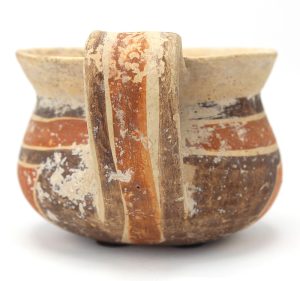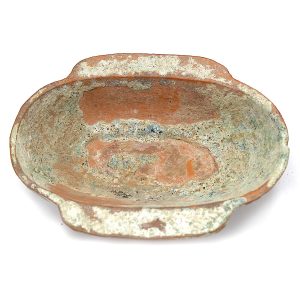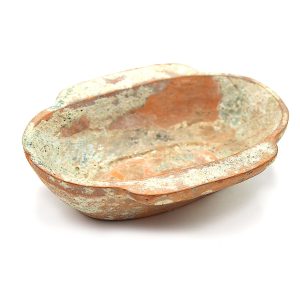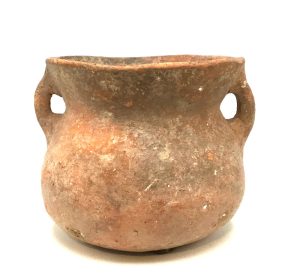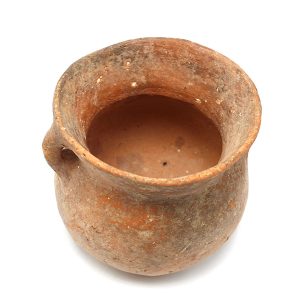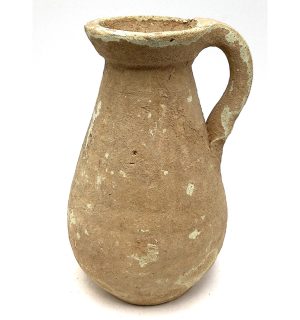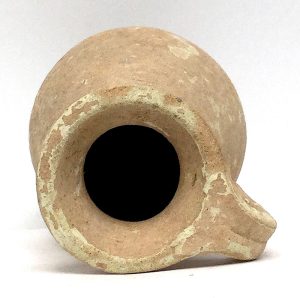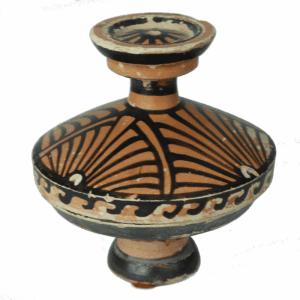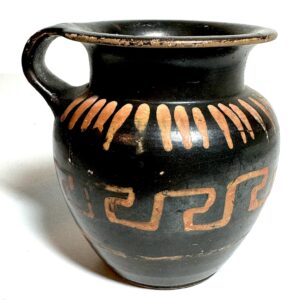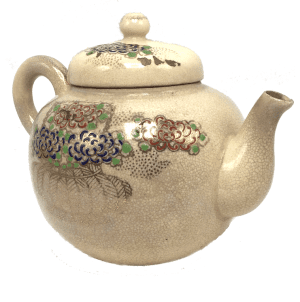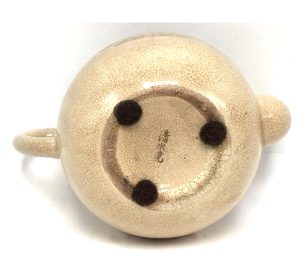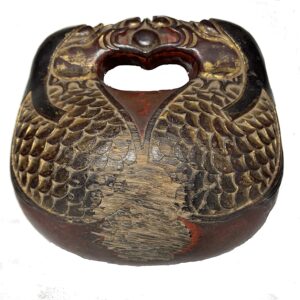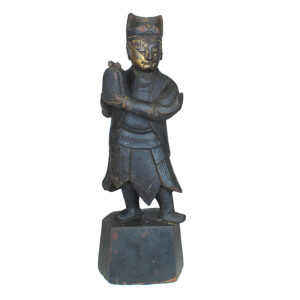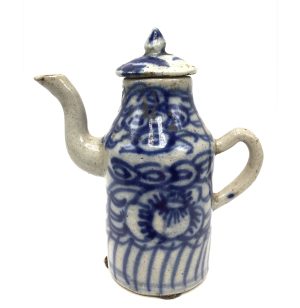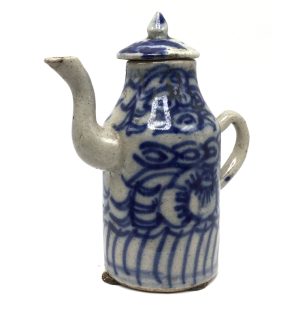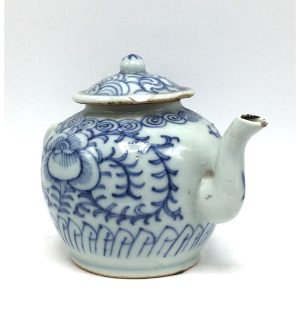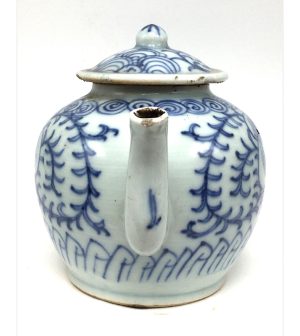Showing 1–12 of 165 results
-
Sale!


$695.00 Original price was: $695.00.$550.00Current price is: $550.00.
H: 3” W: 4.75” D: 4” | FREE SHIPPING IN CONTINENTAL U.S.
This Daunian style earthenware cup was produced in the ancient northern Italian region Apulia, then known as Magna Graecia, from the 6th or 5th centuries B.C.E.. It was covered with beige slip and painted with red, brown and black earth colors in a variety of geometric patterns. Its curved rim and high handle was ideal for pouring liquids like water and wine. The handle may have been repaired as there is an uneven slip underneath it or may have been attached it was painted but it is otherwise in very good condition.
-
Sale!


$450.00 Original price was: $450.00.$310.00Current price is: $310.00.
H: 1.5″ W: 5.125 ” D: 3.875 ” | FREE SHIPPING WITHIN CONTINENTAL U.S.!
Used for rituals and ceremonies, lead green glazed earthenware wing cups were popular burial objects. The tomb’s humidity caused the lead to oxidize to a lustrous, prized iridescent, silver-green.
-
Sale!


$395.00 Original price was: $395.00.$315.00Current price is: $315.00.
H: 2.5″ W: 4.5″ D: 2.375″ | FREE SHIPPING WITHIN CONTINENTAL U.S.!
This diminutive mingqi pig is totally charming and fanciful with an iridescent glaze and would be especially appealing as a send off for the deceased to the nether world or in a contemporary setting. Pigs were especially prized and images were often included as items the deceased would need to live comfortably in the after life.
-
Sale!


$395.00 Original price was: $395.00.$275.00Current price is: $275.00.
H: 3.375” W: 4.25” D: 3.75” | FREE SHIPPING WITHIN CONTINENTAL U.S.
This ancient Judean vessel created during Israel’s Biblical Period was hand shaped using the coil method. It likely held potable liquids, cooking oil or other items. This is a rather sophisticated piece for Bronze Age vessel made millennia ago.
-
Sale!


$275.00 Original price was: $275.00.$210.00Current price is: $210.00.
H: 4.5” W: 3” D: 2.75” | FREE SHIPPING WITHIN CONTINENTAL U.S. !
Greek style Oenochoe wine jugs were made in Roman North Africa and exported throughout the empire. Potters wheel made unadorned coarse wears like this small vessel with everted rim were made for daily use and for offerings to deities.
-
Sale!


$595.00 Original price was: $595.00.$450.00Current price is: $450.00.
Ht: 3.5” Dia: 3.5” FREE SHIPPING WITHIN CONTINENTAL U.S.
ancient xenon ware lekanis from Apulia in Magna Graecia, Roman name for the South Italy coastal area. With close-fitting top held cosmetics. Considered fine ware, fathers filled them with jewelry for their daughters’ wedding gifts.
-
Sale!


$595.00 Original price was: $595.00.$475.00Current price is: $475.00.
H: 3.125” W: 3” D: 2.875” | FREE SHIPPING IN CONTINENTAL U.S.
Miniature 4th century BCE elegant xenon Apulia vessel, flared rim and handle, with painted orange geometric designs which may have been a child’s cup or used for votive purposes.
-
Sale!


$285.00 Original price was: $285.00.$225.00Current price is: $225.00.
H: 4” W: 5.25” D: 3.5” | FREE SHIPPING WITHIN CONTINENTAL U.S.
Hand thrown and -painted Meiji single serving Kyo Ware teapot with luminescent crackled glaze and kiln seal. A chrysanthemum in a basket symbolizes longevity and rejuvenation. Kyo ware is limited, making it collected worldwide.
-
Sale!


$875.00 Original price was: $875.00.$725.00Current price is: $725.00.
H: 12″ W: 11.75″ D: 9.5″ | CALL 213-568-3030 OR EMAIL [email protected] FOR SHIPPING.
Intricately carved Cadence or “Wakeful” Drum used by monks and chanters to awaken the mind and keep meditators attentive and mindful. Used In Pure Land Buddhism for chanting Amitabha Buddha’s name. Fish on handle symbolize wakeful mind as fish never close their eyes.
-
Sale!


$435.00 Original price was: $435.00.$365.00Current price is: $365.00.
H: 15.5″. W: 5.5″. D: 4.24″ | FREE SHIPPING WITHIN CONTINENTAL U.S.
Taoist attendant holding an offerings tied with ribbons that symbolized longevity for generations. Some gilt and lacquer has naturally darkened from years age and incense.
-
Sale!


$135.00 Original price was: $135.00.$95.00Current price is: $95.00.
H: 5.25″ W: 4.625″ D: 2.375″ | FREE SHIPPING WITHIN CONTINENTAL U.S.
Charming miniature pitcher probably used in a restaurant or home kitchen as a dispenser for soy sauce, oils or other liquids. Elegant shape, covered with chrysanthemums, plantain leaves and bindweed vines with lotus bud on top.
-
Sale!


$175.00 Original price was: $175.00.$115.00Current price is: $115.00.
H: 5.25” W: 4.75” D: 2.375” | FREE SHIPPING IN CONTINENTAL US
Small teapot with intricate cobalt blue chrysanthemum and bindweed designs widely used in late 19th century in domestic and export wares. Ball handle on lid.
End of content
End of content


